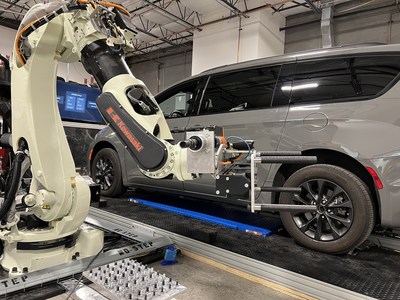A startup based in Detroit, which aimed to revolutionize tire changes through robotics, has declared bankruptcy, signaling a potential glimmer of hope for those concerned about automation’s impact on employment. RoboTire, established in 2019, sought to streamline vehicle maintenance processes for auto repair shops, fleet operators, and dealerships. However, it has now filed for Chapter 7 bankruptcy.
While RoboTire made ambitious claims about its robotic arm reducing lengthy repairs to mere 15-minute tasks, the reality seems less impressive. Although the robotic arm demonstrated proficiency in tire changing and precise torque application, its operational speed and limitation to one side of the vehicle raised doubts about its time-saving capabilities. Comparatively, a human mechanic armed with an impact wrench could likely perform the task more swiftly. Furthermore, RoboTire’s integration with automated wheel mounting and balancing systems required substantial investment, making it less cost-effective than traditional human mechanics.
Despite initial optimism fueled by support from Discount Tire and a successful Series A funding round in 2021, the company’s financial woes led to its bankruptcy filing. CEO Victor Darolfi had previously expressed confidence in revolutionizing tire-changing technology with Discount Tire’s support. However, the company’s assets, primarily comprising intellectual property, face a lien from Discount Tire, its largest creditor.
Alongside Discount Tire, other creditors, including American Funding Services, have pursued legal action against RoboTire, indicating a broader financial struggle. The bankruptcy case involves approximately 70 unsecured creditors, predominantly based in Michigan, underscoring the local impact of RoboTire’s downfall.
As the bankruptcy proceedings unfold, it’s anticipated that all assets will be liquidated to settle outstanding debts. Despite RoboTire’s promising vision, its financial challenges highlight the complexities and risks associated with pioneering automation in traditional industries.

